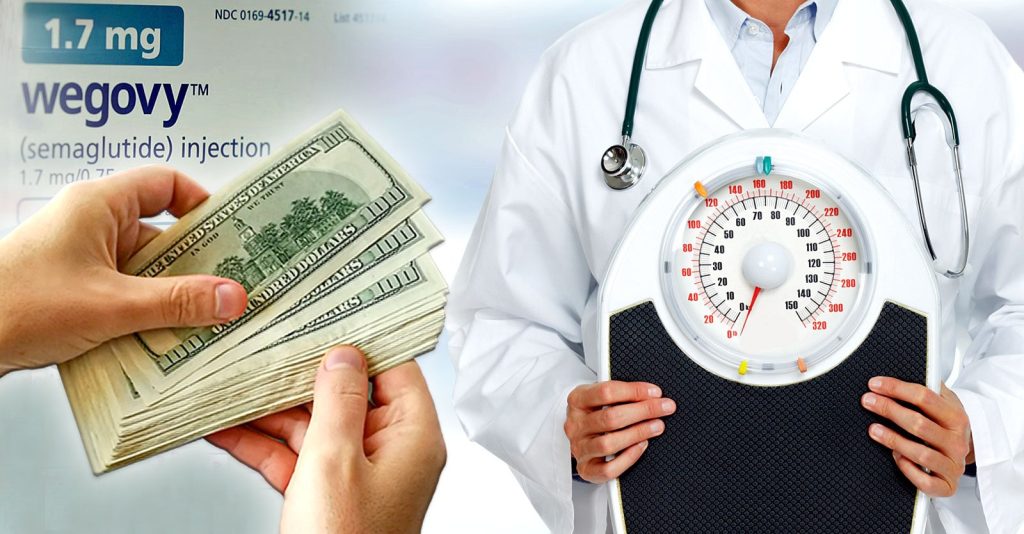An “elite” and influential group of obesity specialists over the last decade pocketed at least $25.8 million in payments from Novo Nordisk, maker of weight loss drugs Wegovy and Saxenda, in exchange for promoting the drugs in their lectures, treatment guidelines, clinics and medical societies, according to an investigation by Reuters.

Please Follow us on Gab, Minds, Telegram, Rumble, GETTR, Truth Social, Twitter
An “elite” and influential group of obesity specialists over the last decade pocketed at least $25.8 million in payments from Novo Nordisk, maker of weight loss drugs Wegovy and Saxenda, in exchange for promoting the drugs in their lectures, treatment guidelines, clinics and medical societies, according to an investigation by Reuters.
“Those payments are part of a campaign to convince U.S. doctors to make Wegovy one of the most widely prescribed drugs in history — and to persuade skeptical insurers to pay for it,” according to the report.
Wegovy and Saxenda have rapidly transformed the treatment of obesity in the U.S., with a boom in prescriptions so big in 2023 that JP Morgan doubled its 10-year sales projection, predicting sales of $71 million for the drugs by 2032.
Despite the drugs’ serious side effects — including major gastrointestinal issues, self-harm behaviors and cancers — the Association of American Pediatrics recommends the drugs in its new clinical guidelines, the American Medical Association urges insurance carriers to cover the drugs, and the mainstream and medical press heavily promote them.
‘They have pushed for urgent prescribing of Wegovy’
Reuters examined data from the federal Open Payments database, which reports payments made by pharmaceutical companies to doctors, other medical professionals and teaching hospitals for consulting, speaking, research, travel or meals. It analyzed payments for speaking, consulting, food and travel for two of Novo’s obesity drugs, Wegovy and Saxenda.
The analysis also excluded payment for research.
Overall, Reuters found at least 57 U.S. physicians each accepted a minimum of $100,000 from Novo in payments related to the two drugs over 10 years. It also found Novo made other large payments to some of those same doctors, but the payments were not classified as related to a particular drug and were not counted in the $25.8 million total.
Of that group, 41 of the physicians run weight-management clinics, work at academic hospitals, write obesity-treatment guidelines or hold top positions at medical societies.
Collectively, the report said:
“[They] have pushed for urgent prescribing of Wegovy and similar medicines to a large proportion of patients with obesity and for comprehensive coverage by government and private insurers. The company and some of its paid experts have called denying coverage tantamount to discrimination against people with obesity, rooted in the faulty notion that they are to blame for their condition.”
Reuters also analyzed Novo’s spending among experts involved in writing five prominent sets of obesity-treatment guidelines for doctors. Among the 109 guideline writers and editors, 53 had accepted payments from companies selling or developing obesity drugs — $8 million of the total $12.4 million of those payments were from Novo.
In a statement provided to Reuters, Novo said, “Responsible engagement between pharmaceutical companies and the medical community is good for patients and advances care and science.”
Since the Affordable Care Act created the Open Payments system over a decade ago, it has been easier to expose the kinds of financial conflicts of interest identified in the report.
However, the increased transparency hasn’t stemmed the flow of industry money, Reuters found. “Companies’ annual payments have surged from $6.5 billion in 2014, the first full year data were collected, to $12.6 billion last year,” the report stated.
Dr. Arthur Kellermann, a health administrator and former dean of the Uniformed Services University of Health Sciences, the U.S. military’s medical school, told Reuters the investigation sheds light on a long-standing problem in the drug industry.
He called the payments “morally and ethically way over the line,” adding:
“The pharmaceutical industry still sees value in paying medical thought leaders to promote their products, and too many of them are happy to sign up for a six- or seven-figure check …
”As sales grow, Medicare and the insurance industry come under intense pressure to pay for these hugely expensive drugs … The end result is that everybody’s healthcare costs go up.”
Another recent report by investigative journalist Lee Fang similarly found a wide network of celebrities, physicians, patient advocacy groups, public health experts, academics, and community leaders have appeared in dozens of media outlets to tout the drugs without disclosing their financial ties to Novo Nordisk.
Which doctors take money from Novo Nordisk?
The report profiled several key physicians taking money from Novo.
For example, Novo paid Lee Kaplan, M.D., Ph.D., chief of obesity medicine at Dartmouth’s medical school, former head of Obesity, Metabolism and Nutrition Institute at Massachusetts General Hospital, and associate professor of medicine at Harvard, $1.4 million for consulting work and travel related to the two drugs between 2013 and 2022.
It also paid him another $976,019 million during that same period for unspecified reasons.
Kaplan, who teaches a popular obesity course taken by physicians seeking certification in obesity medicine or continuing education credits — for which Novo contributed $10,000 this year — dismissed the idea that he is a mouthpiece for the drugmaker. He told Reuters he accepts money from numerous companies and “that he’s not beholden to any one drugmaker.”
Another physician, Dr. Donna Ryan, former president of The Obesity Society and member of The Diplomate at the American Board of Obesity Medicine, has taken more than $1 million from Novo over the last decade, including $600,691 related to Wegovy and Saxenda.
Ryan was instrumental in persuading the U.S. Office of Personnel Management to cover Wegovy and similar drugs for millions of federal workers, an agency official told Reuters.
In the process, she connected government officials with two key groups: the Obesity Action Coalition, a nonprofit advocacy group, and the STOP Obesity Alliance at George Washington University. Both have ties to drugmakers.
Novo is the Obesity Action Coalition’s top corporate donor, paying it more than $500,000 annually.
STOP medical director Dr. Scott Kahan, who will assist in writing The Obesity Society’s new “standards-of-care” guidelines that primary-care doctors commonly use as a quick-reference guide, has accepted more than $300,000 from Novo.
Dr. Jamy Ard, of Wake Forest University, the incoming president of The Obesity Society who will oversee the guideline writing, has taken over $200,000 from Novo.
Ryan told Reuters she had no qualms about taking such payments, “Being a purist isn’t helping anyone,” she told Reuters.
The report also quoted Ryan speaking to a group of doctors at a conference, where she argued that these blockbuster drugs have been positive for both patients and investors. “There is nothing wrong with money,” Ryan said.
She and obesity specialist Dr. Ken Fujioka, director of the Scripps Clinic Nutrition and Metabolic Research Center in San Diego, have taken 130 Novo-paid trips over the past decade, traveling to make speeches and do consulting.
They said the travel allows them to provide medical advice that is valuable to patients, physicians and the manufacturer.
But other doctors disagreed. Dr. Adriane Fugh-Berman, a professor of pharmacology and physiology at Georgetown University Medical Center who studies pharmaceutical marketing practices, told Reuters:
“These highly paid doctors end up drowning out the voices of people who aren’t being flown around to every medical meeting. As a result, there’s not a lot of resistance to the prevailing industry-funded view.”
‘Serious and under-discussed risks for pregnant women’
The 2020 U.S. approval of Novo Nordisk’s Saxenda, a once-daily injection for weight loss, opened a new era of pharmaceutical-based weight management, The Defender reported.
This was followed, in June 2021, by the licensing of Wegovy, and less than a year later of Ozempic, which is indicated for Type 2 diabetes, but contains the same active ingredient, semaglutide, as Wegovy, and is prescribed off-label for weight loss.
Semaglutide drugs are taken as a once-weekly injection, which is considered a benefit compared to a once-daily jab. Liraglutide is a daily shot. Semaglutide is also available as a once-daily pill under the brand name Rybelsus, another Novo drug.
These drugs mimic the GLP-1 hormone, which assists patients in losing weight by regulating their appetite.
In November 2023, the FDA approved Eli Lilly’s Zepbound, another injectable diabetes drug, for weight loss. The active ingredient in Zepbound, tirzepatide, sets this drug apart from Wegovy and Ozempic but it works similarly through a weekly injection.
Tirzepatide is sold by Eli Lilly as a diabetes drug under the trade name Mounjaro.
These approvals were accompanied by what Fang called a Novo Nordisk-driven “aggressive campaign to persuade Americans of the merits of semaglutide.”
According to a KFF Health poll, 45% of adults would take a “safe and effective prescription weight loss drug,” including 59% of those trying to lose weight.
Enthusiasm fell to just 23%, however, when they learned that treatment involved a routine injection, to 16% if either insurance did not cover the high monthly cost or if the drug was not specifically approved for weight loss.
The surging popularity of the medication led to shortages and made Novo Nordisk one of the most valuable global pharmaceutical companies, behind Johnson & Johnson and Eli Lilly.
The shortages raised concerns because the drugs are not made for short-term use. Studies show that when people stop taking them, they regain much of the weight they lost, or potentially gain even more weight. Most people who start taking the drugs and want the effects to last will have to stay on them long-term.
But recent pharmacy claims data shows that most people who start taking Wegovy stop taking it within a year, some because of side effects and some because of the high cost of the drugs.
In addition to suicidal ideation and thoughts of self-harm, pancreatic cancer and gastrointestinal disorders, other adverse effects linked to semaglutide are also becoming apparent. A study using data from EudraVigilance, also found metabolic, nutritional, eye, renal, urinary and cardiac disorders were also reported.
The drugs also carry serious and under-discussed risks for pregnant women.
Despite the high drug cost and the associated risks, there is an ongoing debate about whether insurance companies and Medicare should cover the cost of weight loss drugs, which would increase profits exponentially.
Reuters reported that Wegovy’s U.S. prescribing label recommends the drug for anyone with a body mass index (BMI) of 30 or higher, the threshold for obesity and for people with a 27 BMI who also have a weight-related medical condition.
That would cover about 46% of American adults — about 120 million people, according to the report.
A study published in March in the NEJM estimated that if Medicare were compelled to cover Wegovy, with an estimated 23% discount, it would cost $27 billion to treat just 10% of patients with obesity enrolled in Medicare. That would equal nearly a fifth of the yearly spending for Medicare’s program covering prescription drugs.
Brenda Baletti Ph.D. is a reporter for The Defender. She wrote and taught about capitalism and politics for 10 years in the writing program at Duke University. She holds a Ph.D. in human geography from the University of North Carolina at Chapel Hill and a master's from the University of Texas at Austin.
“© [Article Date] Children’s Health Defense, Inc. This work is reproduced and distributed with the permission of Children’s Health Defense, Inc. Want to learn more from Children’s Health Defense? Sign up for free news and updates from Robert F. Kennedy, Jr. and the Children’s Health Defense. Your donation will help to support us in our efforts.
























